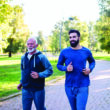Positive benefits of exercise before surgery
A recent clinical trial at Memorial Sloan Kettering Cancer Center in New York suggests that specific

amounts of exercise before surgery among men with early-stage prostate cancer can improve two biomarkers associated with better outcomes.
This study looked at how exercise might help men with localized prostate cancer. Earlier studies showed that exercising after a prostate cancer diagnosis might lower the risk of dying from the disease; however, it wasn’t clear how much exercise is needed to be effective. The goal was to determine a recommended “dose” of exercise for prostate cancer patients and see if exercise could affect the biology of prostate tumors.
The study involved 53 inactive men with prostate cancer who had not yet started treatment. The men ranged in age from 47 to 74 years. More than one-third that were identified as non- white. During the study these men exercised at different levels, from 90 to 450 minutes per week, doing moderate
treadmill walking, while their activity was monitored remotely. Researchers checked how much of the exercise the men could handle and tracked changes in their tumor activity (Ki-67 a marker of how fast cancer cells are dividing (cancer cell proliferation), PSA levels (a blood marker for prostate cancer), and safety.
All exercise levels were attainable for the participants. The 225 minutes per week dose, or 45 minutes per day, five days a week, was determined to be the appropriate dose. It was the lowest amount of exercise that was feasible and improved the prostate cancer biomarkers. Exercising for 375 minutes was associated with similar reductions in the biomarkers, but only slightly. More exercise was not significantly better. No serious side effects were reported, indicating that this level of exercise is safe.
This study suggests that exercise therapy is feasible and safe for men
with localized prostate cancer, and it may have benefits for the biology of the tumor. Larger and longer clinical trials are necessary to examine the impact of exercise on survival and patient outcomes.
JAMA Oncol. 2024;10(9):1187-1194. doi:10.1001/jamaoncol.2024.2156





















